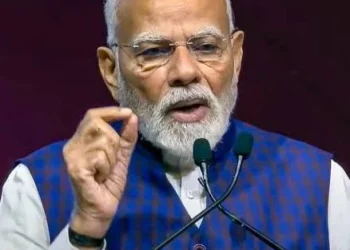By Navin Upadhyay
The passing of Gyalo Thondup earlier this month marks the end of an era for Tibet’s complex and often shadowy political saga. Thondup, elder brother to the Dalai Lama, was a figure who operated largely behind the scenes, serving as a critical intermediary between the exiled Tibetan leadership and global powers—China, India, and the United States—for over four decades. His death at the age of 95, announced quietly this month, underscores a growing void in the Tibetan cause, one that raises pressing questions about its future as the older generation of leaders fades away.
The Million-dollar question is: Whil fill the void that Gyalo Thondup left behind?
Thondup’s life was defined by his unique position. As the Dalai Lama’s sibling, anonymity was never an option, yet he eschewed the spotlight, preferring to wield influence through discreet diplomacy. His role as a conduit to Beijing, New Delhi, and Washington made him a pivotal, if understated, player in the Tibetan struggle. However, his passing has cast a stark light on the diminishing pool of elder statesmen who can hold China accountable for promises made decades ago.
Also Read: China Forces 1 M Tibetan Children into “Culture-Wiping” Schools
A Voice of Forgotten Promises
Writing in the South China Morning Post (SCMP), Robert Barnett, a Tibet expert from the School of Oriental and African Studies in London, framed Thondup’s death as a symbolic milestone. “It has brought China’s leaders ever closer to the point where there are no Tibetan, Mongolian, or other non-Chinese leaders alive who can personally remind the Communist Party of the promises of autonomy and cultural tolerance it made to them in the 1950s and sometimes again in the late 1970s, but has since discarded,” Barnett observed. This erosion of living memory is significant, as it weakens the historical leverage Tibetans might wield in negotiations.
HHDL presided over memorial prayer service of his elder brother, late Gyalo Thondup at Tashi Lhunpo monastery on February 09, 2025. Gyalo Thondup is one of the most important figure in modern Tibetan history, who passed away yesterday in Kalimpong at the age of 97. pic.twitter.com/HFc5KpMM0U
— Voice Of Tibet (@VOT_Tibetan) February 9, 2025
One such promise, central to Thondup’s legacy, was a statement reportedly made to him by Deng Xiaoping, China’s late General Secretary, in the late 1970s: “Except independence (for Tibet), everything is negotiable.” For Thondup, this was a cornerstone of potential dialogue—a rare glimpse of flexibility from Beijing. Yet, China has consistently denied the statement’s existence, with officials claiming it is absent from their records. Chinese Tibetologists echo this, asserting their archives contain no trace of Deng’s words. The dispute exemplifies the widening chasm between Tibetan narratives and Beijing’s official history, a gap Thondup spent much of his life trying to bridge.
ALSO READ: 40 Years Later: Sajjan Kumar Gets Life for 1984 Sikh Riots Murders
A Maverick Sidelined
Thondup’s approach to the Tibetan issue was not without controversy, particularly among the exiled Tibetan community based in Dharamsala, India. Unlike many of his peers, he rejected the hardline stance that “Tibet has never been part of China,” a position that has long underpinned the exile movement’s rhetoric. According to Barry Sautman, a professor at the Hong Kong University of Science and Technology quoted by the SCMP, Thondup believed this stance doomed any prospect of meaningful dialogue with China. His pragmatism, however, came at a cost: he was increasingly sidelined by the exile leadership, who saw his views as a betrayal of their cause.
Sautman argues that for negotiations to resume, the Dalai Lama himself would need to abandon this “basic political orientation” and accept that the emigre movement “has no future.” Such a shift would be seismic—and, for the current Tibetan leadership in exile, unthinkable. Yet, as Thondup’s generation passes, including potentially the Dalai Lama himself (now 89), the question looms: what happens next? Many younger Tibetans, now scattered across the West, lack fluency in Mandarin and have no direct experience engaging Beijing. The continuity of leadership and strategy appears increasingly fragile.
The U.S. Factor: Leverage or Lip Service?
The United States has sought to position itself as a player in the Tibet question, most recently with the Resolve Tibet Act, passed in July 2024. The legislation calls for unconditional dialogue between Beijing and the Dalai Lama and aims to bolster prospects for a negotiated settlement. It builds on earlier measures, such as the Tibet Policy and Support Act of 2019 and the Reciprocal Access to Tibet Act of 2018. On paper, these moves signal robust American support for Tibet. In practice, their impact is less clear.
Critics argue that Washington’s interest in Tibet is more about geopolitical posturing—using the issue to needle China—than a coherent strategy for resolution. Thondup himself was skeptical of U.S. intentions, a sentiment he aired in a 2003 Radio Free Asia interview. Reflecting on decades of engagement, he declared that neither the U.S. nor India could resolve the Tibetan issue. His disillusionment stemmed from bitter experience, particularly his involvement with the CIA during the Cold War.
In his memoir, The Noodle Maker of Kalimpong, Thondup laid bare his regrets: “In all my life I have only one regret, my involvement with the CIA … it only sought to stir up trouble and use Tibetans to create misunderstandings and discord between China and India.” The CIA’s covert backing of Tibetan guerrillas in the 1950s and ’60s, he believed, was less about liberation than destabilizing China—a misadventure that left lasting scars on the Tibetan movement and Thondup personally.
A Legacy in Limbo
Gyalo Thondup’s death leaves behind a legacy as complex as the man himself: a diplomat who navigated treacherous waters, a realist who clashed with idealists, and a witness to promises unfulfilled. His passing sharpens the existential dilemmas facing Tibet’s cause. With China tightening its grip on the region and the exile community grappling with an uncertain future, the voices capable of bridging past and present are growing silent. Whether the next generation can adapt—or whether the U.S. and other powers will move beyond symbolic gestures—remains to be seen. For now, Thondup’s quiet exit serves as a poignant reminder of how much has been lost, and how much still hangs in the balance.














